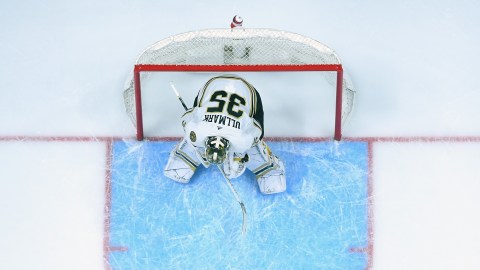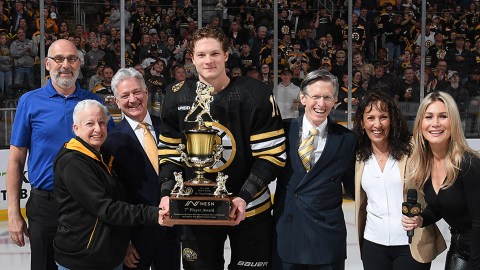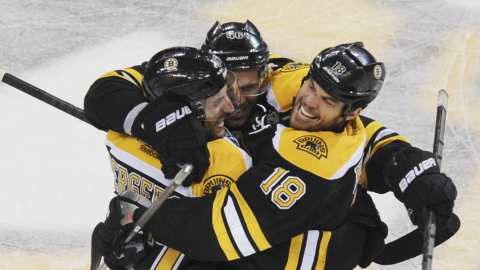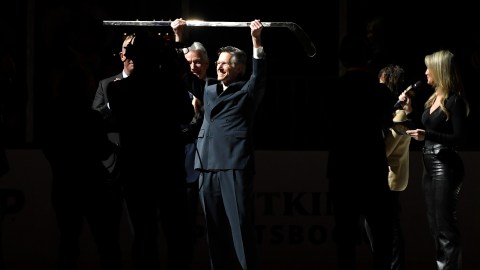The Bruins haven't made a lot of moves this summer. Coming off a Stanley Cup with the bulk of that championship lineup under contract doesn't leave a lot of need for tweaking the roster.
The Bruins did make one significant change on the blue line, however. Tomas Kaberle was allowed to leave via free agency just a little over four months after general manager Peter Chiarelli paid a king's ransom to acquire the puck-moving defenseman from Toronto.
Despite coming at the cost of highly-regarded prospect Joe Colborne and first- and second-round picks (a price much easier to accept thanks to that shiny new silver trophy the team now possesses), Chiarelli didn't compound the mistake by tying up precious cap space to keep Kaberle around.
Instead, he found a much more reasonable alternative in Joe Corvo, who comes to Boston for the cost of just a fourth-round pick and brings along only one year at $2.25 million left on his current contract. Kaberle, by comparison, landed a three-year deal with Carolina worth $4.25 million a season.
Clearly, Corvo is the more fiscally responsible choice. But will he prove a better fit on the Bruins' blue line than Kaberle did in his brief stint in Boston?
The test for that won't come until he gets on the ice and the Bruins see how Corvo meshes with the other blueliners, but on paper he certainly appears a better match for Boston's needs.
"I think when you look at Corvo, who's got a really good shot, he's a player that's maybe a little bit more physical and more engaged [than Kaberle]," Bruins coach Claude Julien said earlier this month. "We're going to have to work with him as far as kind of making him understand the way we play here. And I think the way we play will certainly help him a little bit. Because again, we don't want him running around, we want him playing well positionally. But he skates well and he'll move the puck well."
Corvo supplies some welcome offensive ability from the back end, where outside of Zdeno Chara (14 goals) and Dennis Seidenberg (7 goals), no Bruin defenseman had more than three goals in the regular season last year. Kaberle managed just one goal in 49 games in Boston (including playoffs), while Corvo had an 11-29-40 campaign in Carolina. That was Corvo's fourth season with double-digit goals in the last six years.
Much of Corvo's production comes on the power play, which just so happens to be the area the Bruins are most desperate to improve. Kaberle was supposed to help in that department, but Boston went just 7 for 66 on the power play (10.6 percent) in 24 games in the regular season after the trade, then 10 for 88 (11.4 percent) in the postseason.
Corvo had 5-18-23 totals on the power play last season, more points than any Bruin blueliner managed as Chara led Boston's defensemen with 15 power-play points, though Kaberle did have 25 (all assists) when his time in Toronto is included.
A lot of Corvo's success comes from his willingness to unleash his powerful shot from the point, something that Kaberle was reluctant to do. Kaberle too often looked to make the perfect play, with those extra passes costing the Bruins some potential scoring chances as opposing penalty killers didn't respect the threat of him shooting and clogged the passing lanes.
That won't be a problem with Corvo, who ranked ninth among the league's defensemen with 191 shots on goal last season. Kaberle had just 130, including 31 in 24 games in Boston.
"When you look at Corvo, his shot is going to be a lot better and hopefully on the power play which we did need some good shots from the back end, it will certainly help us," Julien said.
Corvo also contributes in more areas, logging an average of 2:42 a game on the penalty kill for Carolina. Julien rarely used Kaberle in shorthanded situations, with Kaberle averaging just 25 seconds a game on the PK.
Corvo saw more ice time in general last year, averaging 24:46 with the Hurricanes. Kaberle played 21:14 in the regular season, but saw his minutes dwindle to 16:01 in the playoffs as he was dropped to the third pairing alongside Adam McQuaid.
That will be an adjustment for Corvo, who isn't as likely to get huge minutes playing behind the returning top two pairs of Chara and Seidenberg and Andrew Ference and Johnny Boychuk. However, if Corvo can earn Julien's trust with some solid two-way play, his addition could ease some of the pressure on Chara and Co. and help keep them fresher for the playoffs.
Corvo, a right-handed shot, might also have to adjust to playing on his off side if he moves into the left-handed Kaberle's old spot next to McQuaid. There's a good chance that's where Corvo will open the season, especially if Julien wants to keep the combinations that were so effective in the playoffs intact, and Corvo has no problems with that alignment.
"I played the left side my first couple of years in L.A., or my last couple of years, actually," Corvo said. "It's not really a big transition for me."
The Bruins just hope the overall transition goes a little smoother than the last defenseman they brought in.
NESN.com Bruins beat writer Douglas Flynn will be answering one question facing the Bruins this offseason each day until Aug. 8.
Monday, July 25: Can Claude Julien get Benoit Pouliot to reach his potential?
Wednesday, July 27: Is the Bruins' fourth line the best fourth line in the NHL?



